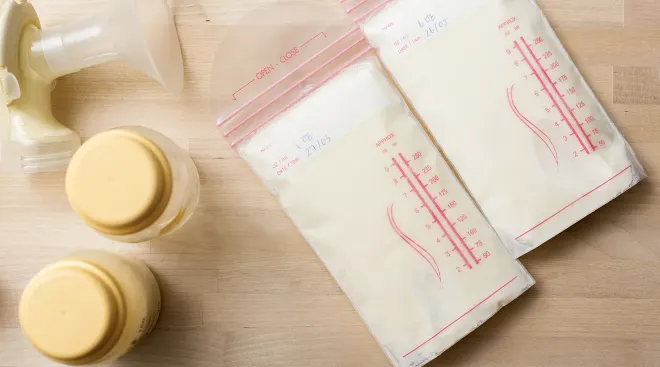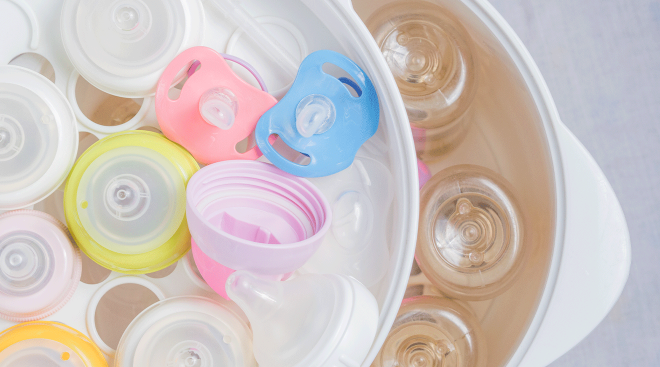How a Lactation Consultant Can Help You on Your Breastfeeding Journey
In a perfect world, breastfeeding would be a seamless experience. In reality, it can be a process with a steep learning curve that requires coaching from someone who knows the ins and outs of feeding baby. That’s where a lactation consultant comes in. These specialists are trained to help guide you on the journey, as well as help address any concerns or questions that come up along the way. But exactly what does a lactation consultant do, and when should you reach out to one? Here’s what you need to know.
At a basic level, a lactation consultant is a professional who helps moms learn the ropes of breastfeeding. They’re healthcare professionals who are skilled in lactation management, explains Rachelle Lessen, MS, RD, IBCLC, a lactation consultant at Children’s Hospital of Philadelphia. “They’re uniquely trained to help families with complex breastfeeding and lactation problems prenatally, in hospital postpartum units and NICUs, in clinics and doctor’s offices and even in family’s homes,” she says. “They educate families and healthcare professionals about the benefits of breastfeeding and help new families establish milk production and get started.”
IBCLC meaning
IBCLC stands for International Board Certified Lactation Consultant. If you see this certification attached to a lactation consultant’s name, you can feel good knowing they’re well-versed and experienced in the world of breastfeeding. IBCLCs are highly trained individuals who “function and contribute as members of the maternal-child health team,” notes the International Board of Lactation Consultant Examiners (IBLCE), an independent international certification body that grants IBCLC credentials. Suffice it to say, IBCLC is the “gold standard” in lactation education and care, says Leigh Anne O’Connor, IBCLC, a lactation consultant and La Leche League leader.
You may come across the term “breastfeeding counselor” or “lactation specialist” at some point; this is typically a person who has some degree of training, but not as extensive as an IBCLC, notes O’Connor. “It’s often a stepping stone to becoming IBCLC or an add-on to other professionals who work in healthcare,” she adds.
Lactation consultants do a lot to help expectant, nursing and pumping moms. Here’s a broad scope of the role they play in your breastfeeding plan:
- Overall breastfeeding education: Lactation consultants provide education about how the process of breastfeeding works, both before you give birth and after. “IBCLCs are professionals skilled at supporting and educating families in assuring their babies are fed appropriately,” O’Connor says.
- Helping moms and babies with latch issues. If baby is struggling to latch properly, a lactation consultant can help work with you to ensure they’re positioned correctly. Moreover, they can help identify challenges like tongue-ties, Lessen says.
- Educating moms on breastfeeding positions. There are a lot of different breastfeeding positions to try, and the right one for you and baby is ultimately the one that’s most comfortable for you both, Lessen says. A lactation consultant can help you figure out what that may be.
- Working with moms with low milk supply. Breastfeeding is ultimately dependent on your milk supply, and a lactation consultant can help counsel you on strategies to boost your supply if it’s lacking, Lessen says.
- Finding solutions for pain. Painful challenges, such as clogged ducts or mastitis, can crop up during breastfeeding, and a lactation consultant can help identify the issue, suggest solutions and find ways to reduce your discomfort, Lessen says.
- Pumping suggestions. Whether you’re planning to [pump exclusively] or on an as-needed basis, a lactation consultant can help you find an optimal schedule that works best for you and baby.
- Weaning help. Lactation consultants can even help at the end of your breastfeeding journey to gradually wean baby in a way that’s comfortable for you both.
Many breastfeeding moms consider seeking out a lactation consultant at the very beginning of their nursing experience, but these professionals can offer support and solutions throughout your entire breastfeeding journey. You may choose to see a lactation consultant:
- Before baby is born. Many lactation consultants run prenatal courses and breastfeeding classes, O’Connor points out.
- Right after birth. Many hospitals and birthing centers have a lactation consultant on-staff who’ll see you after baby is born to help you get established with breastfeeding, O’Connor says. If you need help after you go home, your pediatrician can often recommend someone.
- As problems and issues arise. “If a person has sore or cracked nipples, if the baby isn’t latching, if the milk supply is low or if they have been told to supplement feedings, these are all reasons to see a lactation consultant,” O’Connor says.
It’s important to know that use of the term “lactation consultant” doesn’t require specific qualifications, so it’s a good idea to seek out someone who is certified as an IBCLC. “IBCLCs are uniquely qualified to provide expert clinical management of complex lactation issues,” Lessen reiterates.
Your hospital or birthing center likely has IBCLCs on staff, so taking advantage of this before you’re discharged after labor and delivery is always encouraged. However, issues often arise after you leave the hospital, when you’re essentially on your own.
If you’re looking for help, start by reaching out to your pediatrician or ob-gyn for a lactation consultant referral. (Your hospital may have even provided a list of options during the discharge process.) Lessen also recommends searching the United States Lactation Consultant Association’s (USLCA) website for a local professional.
Ultimately, you’ll want to find someone who makes you feel empowered, so perusing parenting groups online for word-of-mouth recommendations can also be helpful. Once you find someone, don’t hesitate to ask questions about their experience or their outlook on breastfeeding. A good match will support you whether you’re planning on exclusively breastfeeding, pumping or supplementing with formula. And if you’re unable to find an IBCLC who fits the bill, consider virtual visits with a lactation consultant. Nowadays, there are many online resources available.
Under the Affordable Care Act, health insurance plans are required to provide breastfeeding support, counseling and equipment for the duration of breastfeeding. However, each insurance plan is different, and there may be some red tape. “Not all IBCLCs are in-network, and some insurance companies won’t cover out-of-network providers,” notes O’Connor.
You shouldn’t have to pay out-of-pocket for a lactation consultant but, if you choose someone who is out of network, you may need to pay anywhere from $100 to $500 an hour, depending on where you live, says O’Connor.
A lactation consultant can be a valuable resource during the early days of parenting. Ultimately, they can help make the process easier, less painful and more fruitful. Breastfeeding isn’t always easy, but having the right support can make all the difference.
About the experts:
Rachelle Lessen, MS, RDN, IBCLC, is a registered dietitian and international board-certified lactation consultant. She earned her bachelor’s degree in dietetics from Drexel University in Philadelphia, and her master’s in health education from Arcadia University in Glenside, Pennsylvania.
Leigh Anne O’Connor, IBCLC, is a lactation consultant in New York City and La Leche League leader.
Please note: The Bump and the materials and information it contains are not intended to, and do not constitute, medical or other health advice or diagnosis and should not be used as such. You should always consult with a qualified physician or health professional about your specific circumstances.
Plus, more from The Bump:
Navigate forward to interact with the calendar and select a date. Press the question mark key to get the keyboard shortcuts for changing dates.




















































